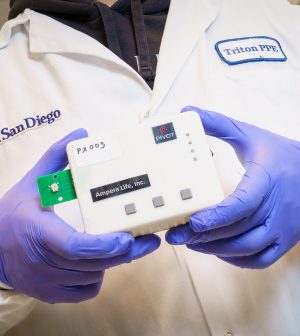- Could Your Grocery Store Meat Be Causing Recurring UTIs?
- Are You Making This Expensive Thermostat Error This Winter?
- Recognizing the Signs of Hypothyroidism
- 10 Strategies to Overcome Insomnia
- Could Artificial Sweeteners Be Aging the Brain Faster?
- Techniques for Soothing Your Nervous System
- Does the Water in Your House Smell Funny? Here’s Why
- Can a Daily Dose of Apple Cider Vinegar Actually Aid Weight Loss?
- 6 Health Beverages That Can Actually Spike Your Blood Sugar
- Treatment Options for Social Anxiety Disorder
New Device Can Check Markers for Parkinson’s, Alzheimer’s Disease

A wireless, noninvasive device has shown promise in detecting the biomarkers of Alzheimer’s and Parkinson’s diseases.
Researchers said the device uses electrical detection to identify proteins associated with Alzheimer’s (amyloid beta and tau) and Parkinson’s (alpha synuclein) in saliva and urine.
“This portable diagnostic system would allow testing at-home and at point of care, like clinics and nursing homes, for neurodegenerative diseases globally,” co-researcher Ratnesh Lal, a professor at the University of California-San Diego Jacobs School of Engineering, said in a university news release.
The device contains a chip with a high-sensitivity transistor that uses DNA to detect amyloid beta, tau or synuclein proteins, researchers said.
Lal said electrical detection is easier to implement and more accurate than chemical detection. He also wanted to create a device that could wirelessly transmit test results to a laptop or smartphone.
Tests on proteins derived from the brains of deceased Alzheimer’s and Parkinson’s patients showed that the biosensors were able to detect specific biomarkers for both conditions with great accuracy, on par with existing methods, findings show.
The device also works well even when samples contain other types of protein, researchers said. Because it works at extremely low concentrations, only small samples are needed, they added.
Tau proteins proved more difficult to detect, but the device can combine results of all three biomarkers to arrive at a reliable overall result, the study found.
UC San Diego has licensed the technology to a biotechnology startup called Ampera Life. Lal is the company’s chairman but does not receive financial support for his research from the company.
Researchers next plan to test blood and cerebro-spinal fluid with the device, before proceeding to saliva and urine samples. The tests would take place in hospital settings and nursing homes.
If those tests go well, Ampera Life plans to seek U.S. Food and Drug Administration approval for the device within the next five to six months. The goal is to have the device on the market in a year.
The findings were published Nov. 13 in the Proceedings of the National Academy of Sciences
More information
The Alzheimer’s Association has more on Alzheimer’s disease.
SOURCE: University of California-San Diego, news release, Nov. 13, 2023
What This Means For You
This new device could help doctors detect and track cases of Alzheimer’s and Parkinson’s diseases.
Source: HealthDay
Copyright © 2026 HealthDay. All rights reserved.










